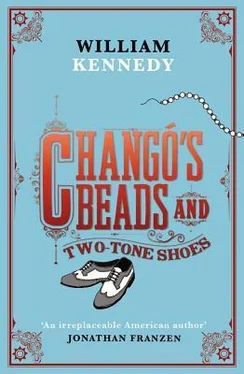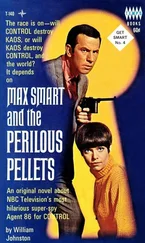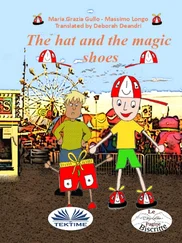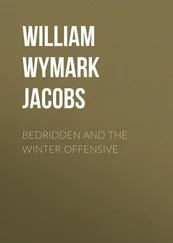George Quinn walked The Gut door-to-door, picking up the play, paying off winners; and when there was no school, Daniel made the rounds with him — the Turk’s grocery store, with a one-arm bandit on the counter, the Double-Dutch Tavern where girls worked the bar day and night, the soap factory, the Albany Water Works, Big Jimmy’s nightclub, the old Times Union where the journalism bug bit Daniel.
“Any candy for me?” George asked his customers, and they’d give him their numbers. If they couldn’t read or write, George would write their play and their bet on a notepad, take their nickel, quarter, dollar, and put the notepad in his shirt pocket, the money in his coat. When the weight started ruining the coat’s shape George would go to a grocery or a bar and change his coins for bills. Quinn helped count coins and could keep leftover pennies for candy, or the penny punchboard. He played the punchboard once and won fifty cents. Eight years old and already rich.
Now, thirty-two years later, Quinn, at the wheel of his ’59 Mercedes 220S, with Matt Daugherty beside him, moved through the streets of the old Gut, houses crumbling and boarded up, pavements pocked with potholes, sidewalks buckled, no people, only the heavy, black dust of a slum in its terminal stage. He drove down South Pearl to Herkimer, this the old Jewish neighborhood and this the street where Isaac Mayer Wise founded Reform Jewry with a fistfight in the old Bethel synagogue, still there, also the street where Claudia lived. He crossed Green and went on to Dongan Avenue, passed St. John’s, the oldest Catholic church in town, built by the Irish, and where Father Peter Young was now helping drunks dry out and get back in the game. Dongan, right there, was where Big Jimmy ran his nightclub, and three blocks south would be where Tremont was lying on his father’s old stoop.
“You said you came here as a kid,” Quinn said to Matt.
“I was seventeen,” Matt said. “Before the war, bar hopping, tryin’ to kick the habit.”
“Coke?”
“Pussy. Didn’t fit with the seminary. I figured I’d give it the big ride and then kiss it good-bye.”
“Did you?”
“I gave it the ride.”
“And kissed it good-bye?”
“Eventually.”
“Understood. You remember Big Jimmy’s club? That’s his old building.”
“I remember his name but I was never in the club.”
“Famous guy, Jimmy Van Ort, maybe seven feet tall, wore a fedora and a vest with a gold pocket watch and chain, best known black man in Albany. One of his ancestors had been a servant to the Good Patroon. Jimmy bet fifty on a number one morning, around 1936, and hit it. In the afternoon he rolled over his payoff on another number and he hit that. He won like eleven thousand, a fortune in ’36. My father wrote Jimmy’s bet.”
Quinn had heard the story eleven thousand times from George Quinn: how news of Jimmy’s hit spread so quickly George insisted on a bodyguard to deliver the winnings. And there came George through the swinging screen doors of Big Jimmy’s — small stage to the right of the doors with an upright piano and jazz till sunrise, where Cody first played when he came to Albany, and, to the left, a room where a card game went on and on. George carried a suitcase and had his cousin with him, Timmy Ryan, a uniformed cop from the Second Precinct. George put the suitcase on the bar.
“You want to count it, Jimmy?”
“What do you think, Georgie?”
“I think you want to count it.”
“You count it.”
“Where?”
“Here.”
George opened the suitcase on the bar, and he sang: “Put your feet on the barroom shelf,
Open the bottle and help yourself.”
He dumped the cash and counted it for Jimmy just as he’d counted it for Joe Marcello before packing it. After the final dollar Jimmy said, “Take fifty for yourself, Georgie.”
“Fifty?”
“Yowsah, man, fifty. You the fella brought the luck. You the fella bringin’ the loot. Take a hundred.”
“A hundred?”
“Take two hundred.”
“Two hundred,” George said. “A nice round figure. Like one of my old girlfriends.”
“Biggest tip my father ever got,” Quinn said. “With his commission for writing Jimmy’s winning play, plus the tip, he made fourteen hundred bucks — all in one day in 1936, a lousy year for the world, but not for Jimmy or George. Jimmy told his bartender, ‘Give Georgie and his friend a drink. The party starts right now. Free beer at Big Jimmy’s for three days and three nights.’ It was like Mardi Gras, a miracle in The Gut, Big Jimmy’s as a shrine to that great corporal work of mercy — give strong drink to the thirsty. My father ordered a small beer.”
Quinn paused.
“Tremont was around for all that, little kid, eight, nine years old. Big Jimmy was his father. Big dad. Big, big dad.”
“Tremont had something to live up to,” Matt said.
“And he put himself out there. Spiffy duds, like his old man. And gutsy, doing that poll watching.”
“I get a kick out of Tremont,” Matt said. “I first saw him sitting on a pile of timbers with a couple of guys, passing the wine. I had my collar on and he says, ‘How you doin’, Monsignor?’ ‘Hey, I’m a bishop,’ I told him, and he said, ‘Yeah, and I’m a senator.’ ‘Senator,’ I say, ‘you wanna go to a meeting? They’re serving soda and cookies at Better Streets over at the church. Eat enough cookies you get to stay alive to drink another day.’ Story short, he shows up with Mary. She’s sober but just bones.”
Tremont came to the meeting in a pink shirt, red tie, double-breasted tan suitcoat with baggy brown slacks, brown and white wingtips, and a brown, jauntily cocked fedora. The suitcoat had major wine stains and the shoes were all but gone, but Matt saw that Tremont was a dude with ambition. Even the limp that came from a badly healed shrapnel wound he’d turned into a strut.
He was living then in his father’s old house with Mary and Peanut, their seven-year-old, whom Tremont had found naked in a vacant lot when he wasn’t a year old, his mother propped against a wall. “Didn’t even have no diaper,” Tremont said. And the mother told him, “You want that little ol’ thing you can have him.” So Tremont took the infant home to Mary, and Peanut grew up as a mascot for the wino crowd, a wild boy who didn’t function in school; but when Mary got the diarrhea Peanut found money somewhere for her Kaopectate.
Quinn and Matt saw Tremont horizontal on the stoop of the house, windows and doors boarded up. Tremont had gotten himself up to the top step but then, with neither the tools nor the strength to pull the boards off the door, he collapsed. He was wearing only his trousers, his shirt, socks and shoes beside him, his coat rolled into a pillow. His legs dangled through the wrought iron railing and a portable radio blared at his ear, Johnny Cash singing about Folsom prison. Rosie, the last whore on Dongan Avenue, wearing her uniform — short skirt and tight sweater — was in a folding chair on the stoop next door, her windows boarded but not her door.
“Back in business, Rosie?” Quinn asked.
“Can’t do business here no more.” She winked at him. “They cut off my water and took down the power line. Gonna knock all the houses down pretty soon.” She winked again. “I just came to get somethin’ and I see Tremont layin’ there and I wonder, anybody gonna help this man? If nobody was I’d of found somebody, but Claudia said somebody’s comin’.”
“Very neighborly, Rosie.”
“I know Tremont thirty years,” she said. “I tended bar for his father. But he’s so sore you can’t even touch him. I tried. He can’t keep his shoes on. I give him my radio and put that coat under his head, but he can’t move. He is a most sorry man.”
Читать дальше












